- Home
- H. Rider Haggard
Fair Margaret
Fair Margaret Read online
Produced by Juliet Sutherland, Steve Flynn, Tonya Allenand PG Distributed Proofreaders
FAIR MARGARET
By
H. RIDER HAGGARD
_Author of "King Solomons Mines" "She" "Jess" etc._
WITH 15 ILLUSTRATIONS BY J. R. SKELTON
London: HUTCHINSON & CO.Paternoster Row 1907.
CONTENTS
CHAPTER IHOW PETER MET THE SPANIARD
CHAPTER IIJOHN CASTELL
CHAPTER IIIPETER GATHERS VIOLETS
CHAPTER IVLOVERS DEAR
CHAPTER VCASTELL'S SECRET
CHAPTER VIFAREWELL
CHAPTER VIINEWS FROM SPAIN
CHAPTER VIIID'AGUILAR SPEAKS
CHAPTER IXTHE SNARE
CHAPTER XTHE CHASE
CHAPTER XITHE MEETING ON THE SEA
CHAPTER XIIFATHER HENRIQUES
CHAPTER XIIITHE ADVENTURE OF THE INN
CHAPTER XIVINEZ AND HER GARDEN
CHAPTER XVPETER PLAYS A PART
CHAPTER XVIBETTY SHOWS HER TEETH
CHAPTER XVIITHE PLOT
CHAPTER XVIIITHE HOLY HERMANDAD
CHAPTER XIXBETTY PAYS HER DEBTS
CHAPTER XXISABELLA OF SPAIN
CHAPTER XXIBETTY STATES HER CASE
CHAPTER XXIITHE DOOM OF JOHN CASTELL
CHAPTER XXIIIFATHER HENRIQUES AND THE BAKER'S OVEN
CHAPTER XXIVTHE FALCON STOOPS
CHAPTER XXVHOW THE _MARGARET_ WON OUT TO SEA
ENVOI
LIST OF ILLUSTRATIONS;
"A DOVE, COMRADES!--A DOVE!"
CASTELL DECLARES HIMSELF A JEW
"YOU MEAN THAT YOU WISH TO MURDER ME"
MARGARET APPEARED DESCENDING THE BROAD OAK STAIRS
IN ANOTHER MOMENT THAT STEEL WOULD HAVE PIERCED HIS HEART
THE GALE CAUGHT HIM AND BLEW HIM TO AND FRO
"LADY," HE SAID, "THIS IS NO DEED OF MINE"
A CRUEL-LOOKING KNIFE AND A NAKED ARM PROJECTEDTHROUGH THE PANELLING
"MY NAME IS INEZ. YOU WANDER STILL, SENOR"
"THERE ARE OTHERS WHERE THEY CAME FROM"
"TO-DAY I DARE TO HOPE THAT IT MAY BE OTHERWISE"
"WAY! MAKE WAY FOR THE MARCHIONESS OF MORELLA!"
"I CUT HIM DOWN, AND BY MISFORTUNE KILLED HIM"
"WE ARE PLAYERS IN A STRANGE GAME, MY LADY MARGARET"
"YOU WILL HAVE TO FIGHT ME FIRST, PETER"
FAIR MARGARET
CHAPTER I
HOW PETER MET THE SPANIARD
It was a spring afternoon in the sixth year of the reign of King HenryVII. of England. There had been a great show in London, for that day hisGrace opened the newly convened Parliament, and announced to hisfaithful people--who received the news with much cheering, since war isever popular at first--his intention of invading France, and of leadingthe English armies in person. In Parliament itself, it is true, thegeneral enthusiasm was somewhat dashed when allusion was made to thefinding of the needful funds; but the crowds without, formed for themost part of persons who would not be called upon to pay the money, didnot suffer that side of the question to trouble them. So when theirgracious liege appeared, surrounded by his glittering escort of noblesand men-at-arms, they threw their caps into the air, and shoutedthemselves hoarse.
The king himself, although he was still young in years, already aweary-looking man with a fine, pinched face, smiled a little sarcasticallyat their clamour; but, remembering how glad he should be to hear it whostill sat upon a somewhat doubtful throne, said a few soft words, andsending for two or three of the leaders of the people, gave them hisroyal hand, and suffered certain children to touch his robe that theymight be cured of the Evil. Then, having paused a while to receivepetitions from poor folk, which he handed to one of his officers to beread, amidst renewed shouting he passed on to the great feast that wasmade ready in his palace of Westminster.
Among those who rode near to him was the ambassador, de Ayala,accredited to the English Court by the Spanish sovereigns, Ferdinand andIsabella, and his following of splendidly attired lords and secretaries.That Spain was much in favour there was evident from his place in theprocession. How could it be otherwise, indeed, seeing that already, fouryears or more before, at the age of twelve months, Prince Arthur, theeldest son of the king, had been formally affianced to the InfantaCatherine, daughter of Ferdinand and Isabella, aged one year and ninemonths? For in those days it was thought well that the affections ofprinces and princesses should be directed early into such paths as theirroyal parents and governors considered likely to prove most profitableto themselves.
At the ambassador's left hand, mounted on a fine black horse, anddressed richly, but simply, in black velvet, with a cap of the samematerial in which was fastened a single pearl, rode a tall cavalier. Hewas about five-and-thirty years of age, and very handsome, havingpiercing black eyes and a stern, clean-cut face.
In every man, it is said, there can be found a resemblance, often faroff and fanciful enough, to some beast or bird or other creature, andcertainly in this case it was not hard to discover. The man resembled aneagle, which, whether by chance or design, was the crest he bore uponhis servants' livery, and the trappings of his horse. The unflinchingeyes, the hooked nose, the air of pride and mastery, the thin, longhand, the quick grace of movement, all suggested that king of birds,suggested also, as his motto said, that what he sought he would find,and what he found he would keep. Just now he was watching the interviewbetween the English king and the leaders of the crowd whom his Grace hadbeen pleased to summon, with an air of mingled amusement and contempt.
"You find the scene strange, Marquis," said the ambassador, glancing athim shrewdly.
"Senor, here in England, if it pleases your Excellency," he answeredgravely, "Senor d'Aguilar. The marquis you mentioned lives in Spain--anaccredited envoy to the Moors of Granada; the Senor d'Aguilar, a humbleservant of Holy Church," and he crossed himself, "travels abroad--uponthe Church's business, and that of their Majesties'."
"And his own too, sometimes, I believe," answered the ambassador drily."But to be frank, what I do not understand about you, Senor d'Aguilar,as I know that you have abandoned political ambitions, is why you do notenter my profession, and put on the black robe once and for all. Whatdid I say--black? With your opportunities and connections it might bered by now, with a hat to match."
The Senor d'Aguilar smiled a little as he replied.
"You said, I think, that sometimes I travel on my own business. Well,there is your answer. You are right, I have abandoned worldlyambitions--most of them. They are troublesome, and for some people, ifthey be born too high and yet not altogether rightly, very dangerous.The acorn of ambition often grows into an oak from which men hang."
"Or into a log upon which men's heads can be cut off. Senor, Icongratulate you. You have the wisdom that grasps the substance and letsthe shadows flit. It is really very rare."
"You asked why I do not change the cut of my garments," went ond'Aguilar, without noticing the interruption. "Excellency, to be frank,because of my own business. I have failings like other men. Forinstance, wealth is that substance of which you spoke, rule is theshadow; he who has the wealth has the real rule. Again, bright eyes maydraw me, or a hate may seek its slaking, and these things do not suitrobes, black or red."
"Yet many such things have been done by those who wore them," repliedthe ambassador with meaning.
"Aye, Excellency, to the discredit of Holy Church, as you, a priest,know better than most men. Let the earth be evil as it must; but let theChurch be like heaven above it, pure, unstained, the vault of prayer,the house of mercy and of righteous judgment, wherein walks no sinnersuch as I," and again he crossed himself.
There was a ring of earnestness in the speaker's voice that caused deAyala, who knew something
of his private reputation, to look at himcuriously.
"A true fanatic, and therefore to us a useful man," he thought tohimself, "though one who knows how to make the best of two worlds aswell as most of them;" but aloud he said, "No wonder that our Churchrejoices in such a son, and that her enemies tremble when he lifts hersword. But, Senor, you have not told me what you think of all thisceremony and people."
"The people I know well, Excellency, for I dwelt among them in pastyears and speak their language; and that is why I have left Granada tolook after itself for a while, and am here to-day, to watch and makereport----" He checked himself, then added, "As for the ceremony, were Ia king I would have it otherwise. Why, in that house just now thosevulgar Commons--for so they call them, do they not?--almost threatenedtheir royal master when he humbly craved a tithe of the country's wealthto fight the country's war. Yes, and I saw him turn pale and tremble atthe rough voices, as though their echoes shook his throne. I tell you,Excellency, that the time will come in this land when those Commons willbe king. Look now at that fellow whom his Grace holds by the hand,calling him 'sir' and 'master,' and yet whom he knows to be, as I do, aheretic, a Jew in disguise, whose sins, if he had his rights, should bepurged by fire. Why, to my knowledge last night, that Israelite saidthings against the Church----"
"Whereof the Church, or its servant, doubtless made notes to be usedwhen the time comes," broke in de Ayala. "But the audience is done, andhis Highness beckons us forward to the feast, where there will be noheretics to vex us, and, as it is Lent, not much to eat. Come, Senor!for we stop the way."
Three hours had gone by, and the sun sank redly, for even at that springseason it was cold upon the marshy lands of Westminster, and there wasfrost in the air. On the open space opposite to the banqueting-hall, infront of which were gathered squires and grooms with horses, stood andwalked many citizens of London, who, their day's work done, came to seethe king pass by in state. Among these were a man and a lady, the latterattended by a handsome young woman, who were all three sufficientlystriking in appearance to attract some notice in the throng.
The man, a person of about thirty years of age, dressed in a merchant'srobe of cloth, and wearing a knife in his girdle, seemed over six feetin height, while his companion, in her flowing, fur-trimmed cloak, was,for a woman, also of unusual stature. He was not, strictly speaking, ahandsome man, being somewhat too high of forehead and prominent offeature; moreover, one of his clean-shaven cheeks, the right, was marredby the long, red scar of a sword-cut which stretched from the temple tothe strong chin. His face, however, was open and manly, if rather stern,and the grey eyes were steady and frank. It was not the face of amerchant, but rather that of one of good degree, accustomed to camps andwar. For the rest, his figure was well-built and active, and his voicewhen he spoke, which was seldom, clear and distinct to loudness, butcultivated and pleasant--again, not the voice of a merchant.
Of the lady's figure little could be seen because of the long cloak thathid it, but the face, which appeared within its hood when she turned andthe dying sunlight filled her eyes, was lovely indeed, for from herbirth to her death-day Margaret Castell--fair Margaret, as she wascalled--had this gift to a degree that is rarely granted to woman.Rounded and flower-like was that face, most delicately tinted also,with rich and curving lips and a broad, snow-white brow. But the wonderof it, what distinguished her above everything else from other beautifulwomen of her time, was to be found in her eyes, for these were not blueor grey, as might have been expected from her general colouring, butlarge, black, and lustrous; soft, too, as the eyes of a deer, andoverhung by curling lashes of an ebon black. The effect of these eyes ofhers shining above those tinted cheeks and beneath the brow of ivorywhiteness was so strange as to be almost startling. They caught thebeholder and held him, as might the sudden sight of a rose in snow, orthe morning star hanging luminous among the mists of dawn. Also,although they were so gentle and modest, if that beholder chanced to bea man on the good side of fifty it was often long before he could forgetthem, especially if he were privileged to see how well they matched thehair of chestnut, shading into black, that waved above them and fell,tress upon tress, upon the shapely shoulders and down to theslender waist.
Peter Brome, for he was so named, looked a little anxiously about him atthe crowd, then, turning, addressed Margaret in his strong, clear voice.
"There are rough folk around," he said; "do you think you should stophere? Your father might be angered, Cousin."
Here it may be explained that in reality their kinship was of theslightest, a mere dash of blood that came to her through her mother.Still they called each other thus, since it is a convenient title thatmay mean much or nothing.
"Oh! why not?" she answered in her rich, slow tones, that had in themsome foreign quality, something soft and sweet as the caress of asouthern wind at night. "With you, Cousin," and she glanced approvinglyat his stalwart, soldier-like form, "I have nothing to fear from men,however rough, and I do greatly want to see the king close by, and sodoes Betty. Don't you, Betty?" and she turned to her companion.
Betty Dene, whom she addressed, was also a cousin of Margaret, thoughonly a distant connection of Peter Brome. She was of very good blood,but her father, a wild and dissolute man, had broken her mother's heart,and, like that mother, died early, leaving Betty dependent uponMargaret's mother, in whose house she had been brought up. This Bettywas in her way remarkable, both in body and mind. Fair, splendidlyformed, strong, with wide, bold, blue eyes and ripe red lips, such wasthe fashion of her. In speech she was careless and vigorous. Fond of thesociety of men, and fonder still of their admiration, for she wasromantic and vain, Betty at the age of five-and-twenty was yet anhonest girl, and well able to take care of herself, as more than one ofher admirers had discovered. Although her position was humble, at heartshe was very proud of her lineage, ambitious also, her great desirebeing to raise herself by marriage back to the station from which herfather's folly had cast her down--no easy business for one who passed asa waiting-woman and was without fortune.
For the rest, she loved and admired her cousin Margaret more than anyone on earth, while Peter she liked and respected, none the less perhapsbecause, try as she would--and, being nettled, she did try hardenough--her beauty and other charms left him quite unmoved.
In answer to Margaret's question she laughed and answered:
"Of course. We are all too busy up in Holborn to get the chance of somany shows that I should wish to miss one. Still, Master Peter is verywise, and I am always counselled to obey him. Also, it will soonbe dark."
"Well, well," said Margaret with a sigh and a little shrug of hershoulders, "as you are both against me, perhaps we had best be going.Next time I come out walking, cousin Peter, it shall be with some onewho is more kind."
Then she turned and began to make her way as quickly as she couldthrough the thickening crowd. Finding this difficult, before Peter couldstop her, for she was very swift in her movements, Margaret bore to theright, entering the space immediately in front of the banqueting-hallwhere the grooms with horses and soldiers were assembled awaiting theirlords, for here there was more room to walk. For a few moments Peter andBetty were unable to escape from the mob which closed in behind her, andthus it came about that Margaret found herself alone among these people,in the midst, indeed, of the guard of the Spanish ambassador de Ayala,men who were notorious for their lawlessness, for they reckoned upontheir master's privilege to protect them. Also, for the most part, theywere just then more or less in liquor.
One of these fellows, a great, red-haired Scotchman, whom thepriest-diplomatist had brought with him from that country, where he hadalso been ambassador, suddenly perceiving before him a woman who appearedto be young and pretty, determined to examine her more closely, and tothis end made use of a rude stratagem. Pretending to stumble, he graspedat Margaret's cloak as though to save himself, and with a wrench tore itopen, revealing her beautiful face and graceful figure.
"A dove, comrades!--a d
ove!" he shouted in a voice thick with drink,"who has flown here to give me a kiss." And, casting his long arms abouther, he strove to draw her to him.
"Peter! Help me, Peter!" cried Margaret as she struggled fiercely in hisgrip.
"No, no, if you want a saint, my bonny lass," said the drunkenScotchman, "Andrew is as good as Peter," at which witticism those of theothers who understood him laughed, for the man's name was Andrew.
Next instant they laughed again, and to the ruffian Andrew it seemed asthough suddenly he had fallen into the power of a whirlwind. At leastMargaret was wrenched away from him, while he spun round and round tofall violently upon his face.
"That's Peter!" exclaimed one of the soldiers in Spanish.
"Yes," answered another, "and a patron saint worth having"; while athird pulled the recumbent Andrew to his feet.
The man looked like a devil. His cap had gone, and his fiery red hairwas smeared with mud. Moreover, his nose had been broken on a cobblestone, and blood from it poured all over him, while his little red eyesglared like a ferret's, and his face turned a dirty white with pain andrage. Howling out something in Scotch, of a sudden he drew his sword andrushed straight at his adversary, purposing to kill him.
Now, Peter had no sword, but only his short knife, which he found notime to draw. In his hand, however, he carried a stout holly staff shodwith iron, and, while Margaret clasped her hands and Betty screamed, onthis he caught the descending blow, and, furious as it was, parried andturned it. Then, before the man could strike again, that staff was up,and Peter had leapt upon him. It fell with fearful force, breaking theScotchman's shoulder and sending him reeling back.
"Shrewdly struck, Peter! Well done, Peter!" shouted the spectators.
But Peter neither saw nor heard them, for he was mad with rage at theinsult that had been offered to Margaret. Up flew the iron-tipped staffagain, and down it came, this time full on Andrew's head, which itshattered like an egg-shell, so that the brute fell backwards, dead.
For a moment there was silence, for the joke had taken a tragic turn.Then one of the Spaniards said, glancing at the prostrate form:
"Name of God! our mate is done for. That merchant hits hard."
Instantly there arose a murmur among the dead man's comrades, and one ofthem cried:
"Cut him down!"
Understanding that he was to be set on, Peter sprang forward andsnatched the Scotchman's sword from the ground where it had fallen, atthe same time dropping his staff and drawing his dagger with the lefthand. Now he was well armed, and looked so fierce and soldier-like as hefaced his foes, that, although four or five blades were out, they heldback. Then Peter spoke for the first time, for he knew that against somany he had no chance.
"Englishmen," he cried in ringing tones, but without shifting his heador glance, "will you see me murdered by these Spanish dogs?"
There was a moment's pause, then a voice behind cried:
"By God! not I," and a brawny Kentish man-at-arms ranged up beside him,his cloak thrown over his left arm, and his sword in his right hand.
"Nor I," said another. "Peter Brome and I have fought together before."
"Nor I," shouted a third, "for we were born in the same Essex hundred."
And so it went on, until there were as many stout Englishmen at his sideas there were Spaniards and Scotchmen before him.
"That will do," said Peter, "we want no more than man to man. Look tothe women, comrades behind there. Now, you murderers, if you would seeEnglish sword-play, come on, or, if you are afraid, let us go in peace."
"Yes, come on, you foreign cowards," shouted the mob, who did not lovethese turbulent and privileged guards.
By now the Spanish blood was up, and the old race-hatred awake. Inbroken English the sergeant of the guard shouted out some filthy insultabout Margaret, and called upon his followers to "cut the throats of theLondon swine." Swords shone red in the red sunset light, men shiftedtheir feet and bent forward, and in another instant a great and bloodyfray would have begun.
But it did not begin, for at that moment a tall senor, who had beenstanding in the shadow and watching all that passed, walked between theopposing lines, as he went striking up the swords with his arm.
"Have done," said d'Aguilar quietly, for it was he, speaking in Spanish."You fools! do you want to see every Spaniard in London torn to pieces?As for that drunken brute," and he touched the corpse of Andrew with hisfoot, "he brought his death upon himself. Moreover, he was not aSpaniard, there is no blood quarrel. Come, obey me! or must I tell youwho I am?"
"We know you, Marquis," said the leader in a cowed voice. "Sheath yourswords, comrades; after all, it is no affair of ours."
The men obeyed somewhat unwillingly; but at this moment arrived theambassador de Ayala, very angry, for he had heard of the death of hisservant, demanding, in a loud voice, that the man who had killed himshould be given up.
"We will not give him up to a Spanish priest," shouted the mob. "Comeand take him if you want him," and once more the tumult grew, whilePeter and his companions made ready to fight.
Fighting there would have been also, notwithstanding all that d'Aguilarcould do to prevent it; but of a sudden the noise began to die away, anda hush fell upon the place. Then between the uplifted weapons walked ashort, richly clad man, who turned suddenly and faced the mob. It wasKing Henry himself.
"Who dare to draw swords in my streets, before my very palace doors?" heasked in a cold voice.
A dozen hands pointed at Peter.
"Speak," said the king to him.
"Margaret, come here," cried Peter; and the girl was thrust forward tohim.
"Sire," he said, "that man," and he pointed to the corpse of Andrew,"tried to do wrong to this maiden, John Castell's child. I, her cousin,threw him down. He drew his sword and came at me, and I killed him withmy staff. See, it lies there. Then the Spaniards--his comrades--wouldhave cut me down, and I called for English help. Sire, that is all."
The king looked him up and down.
"A merchant by your dress," he said; "but a soldier by your mien. Howare you named?"
"Peter Brome, Sire."
"Ah! There was a certain Sir Peter Brome who fell at Bosworth Field--notfighting for me," and he smiled. "Did you know him perchance?"
"He was my father, Sire, and I saw him slain--aye, and slew the slayer."
"Well can I believe it," answered Henry, considering him. "But how comesit that Peter Brome's son, who wears that battle scar across his face,is clad in merchant's woollen?"
"Sire," said Peter coolly, "my father sold his lands, lent his all tothe Crown, and I have never rendered the account. Therefore I must liveas I can."
The king laughed outright as he replied:
"I like you, Peter Brome, though doubtless you hate me."
"Not so, Sire. While Richard lived I fought for Richard. Richard isgone; and, if need be, I would fight for Henry, who am an Englishman,and serve England's king."
"Well said, and I may have need of you yet, nor do I bear you anygrudge. But, I forgot, is it thus that you would fight for me, bycausing riot in my streets, and bringing me into trouble with my goodfriends the Spaniards?"
"Sire, you know the story."
"I know your story, but who bears witness to it? Do you, maiden, Castellthe merchant's daughter?"
"Aye, Sire. The man whom my cousin killed maltreated me, whose onlywrong was that I waited to see your Grace pass by. Look on mytorn cloak."
"Little wonder that he killed him for the sake of those eyes of yours,maiden. But this witness may be tainted." And again he smiled, adding,"Is there no other?"
Betty advanced to speak, but d'Aguilar, stepping forward, lifted hisbonnet from his head, bowed and said in English:
"Your Grace, there is; I saw it all. This gallant gentleman had noblame. It was the servants of my countryman de Ayala who were to blame,at any rate at first, and afterwards came the trouble."
Now the ambassador de Ayala broke in, claiming satisfaction fo
r thekilling of his man, for he was still very angry, and saying that if itwere not given, he would report the matter to their Majesties of Spain,and let them know how their servants were treated in London.
At these words Henry grew grave, who, above all things, wished to giveno offence to Ferdinand and Isabella.
"You have done an ill day's work, Peter Brome," he said, "and one ofwhich my attorney must consider. Meanwhile, you will be best in safekeeping," and he turned as though to order his arrest.
"Sire," exclaimed Peter, "I live at Master Castell's house in Holborn,nor shall I run away."
"Who will answer for that," asked the king, "or that you will not makemore riots on your road thither?"
"I will answer, your Grace," said d'Aguilar quietly, "if this lady willpermit that I escort her and her cousin home. Also," he added in a lowvoice, "it seems to me that to hale him to a prison would be more liketo breed a riot than to let him go."
Henry glanced round him at the great crowd who were gathered watchingthis scene, and saw something in their faces which caused him to agreewith d'Aguilar.
"So be it, Marquis," he said. "I have your word, and that of PeterBrome, that he will be forthcoming if called upon. Let that dead man belaid in the Abbey till to-morrow, when this matter shall be inquired of.Excellency, give me your arm; I have greater questions of which I wishto speak with you ere we sleep."

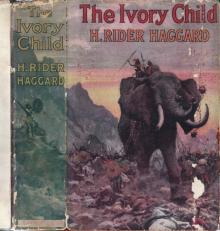 The Ivory Child
The Ivory Child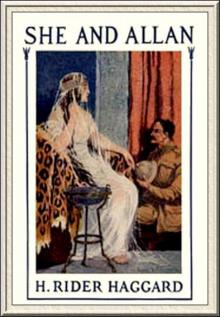 She and Allan
She and Allan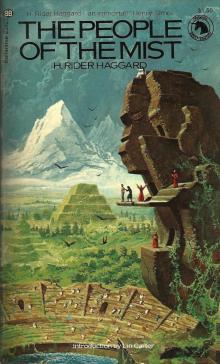 The People of the Mist
The People of the Mist She
She Morning Star
Morning Star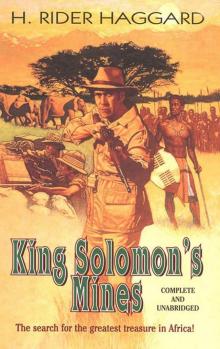 King Solomon's Mines
King Solomon's Mines She: A History of Adventure
She: A History of Adventure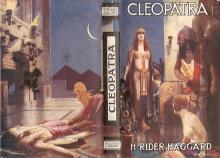 Cleopatra
Cleopatra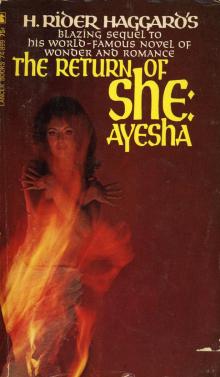 Ayesha, the Return of She
Ayesha, the Return of She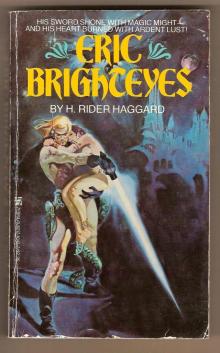 Eric Brighteyes
Eric Brighteyes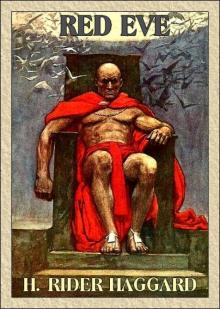 Red Eve
Red Eve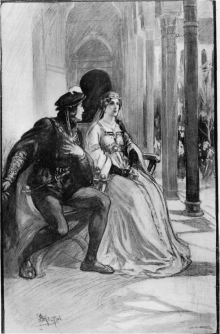 Fair Margaret
Fair Margaret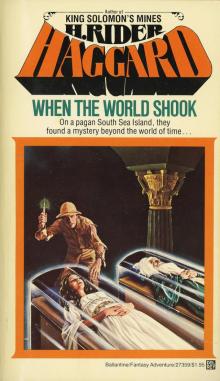 When the World Shook
When the World Shook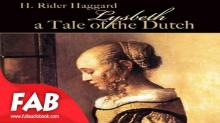 Lysbeth, a Tale of the Dutch
Lysbeth, a Tale of the Dutch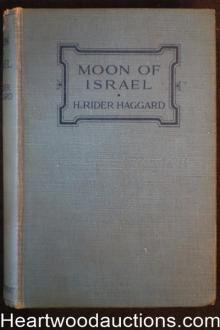 Moon of Israel: A Tale of the Exodus
Moon of Israel: A Tale of the Exodus Long Odds
Long Odds The Ghost Kings
The Ghost Kings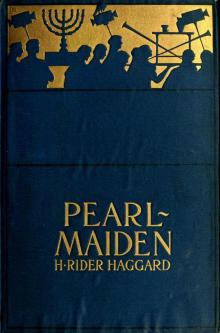 Pearl-Maiden: A Tale of the Fall of Jerusalem
Pearl-Maiden: A Tale of the Fall of Jerusalem Allan and the Holy Flower
Allan and the Holy Flower Smith and the Pharaohs, and other Tales
Smith and the Pharaohs, and other Tales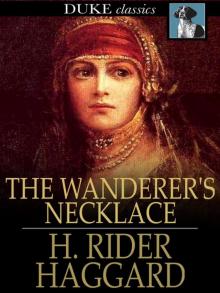 The Wanderer's Necklace
The Wanderer's Necklace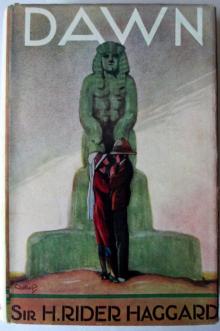 Dawn
Dawn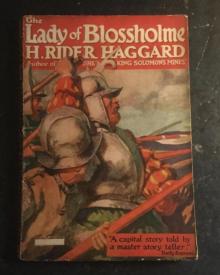 The Lady of Blossholme
The Lady of Blossholme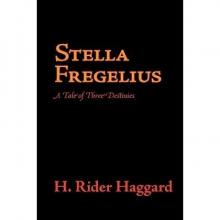 Stella Fregelius: A Tale of Three Destinies
Stella Fregelius: A Tale of Three Destinies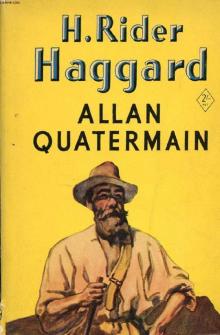 Allan Quatermain
Allan Quatermain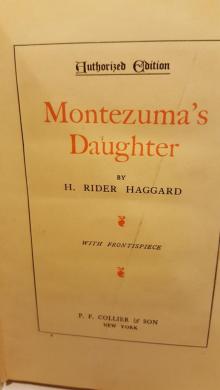 Montezuma's Daughter
Montezuma's Daughter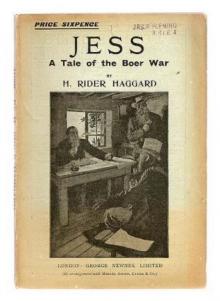 Jess
Jess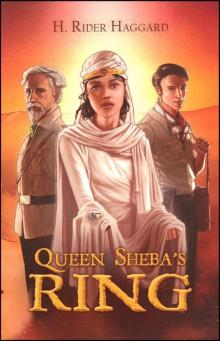 The Brethren
The Brethren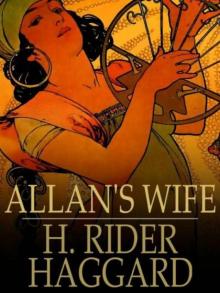 Allan's Wife
Allan's Wife Child of Storm
Child of Storm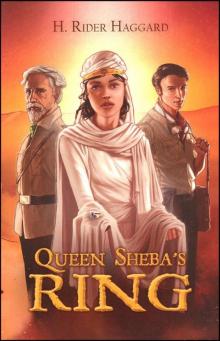 Queen Sheba's Ring
Queen Sheba's Ring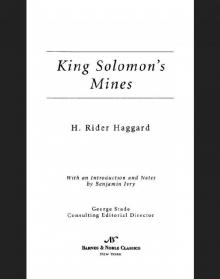 King Solomon's Mines (Barnes & Noble Classics Series)
King Solomon's Mines (Barnes & Noble Classics Series)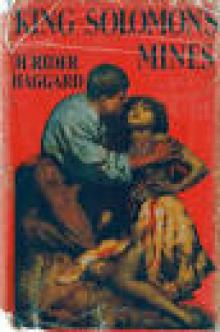 Complete Allan Quatermain Omnibus - Volumes 1 - 10
Complete Allan Quatermain Omnibus - Volumes 1 - 10